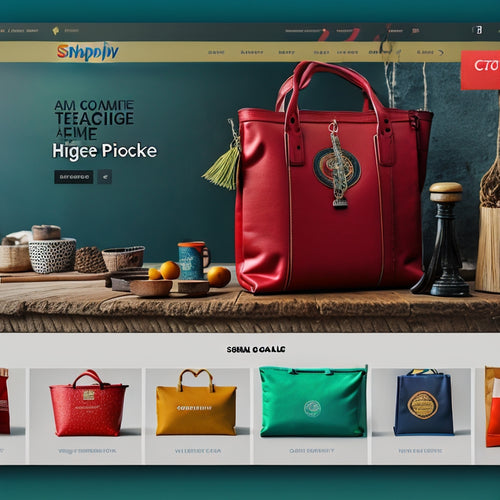
What Apps Should I Use on My Shopify Store
Share
In the realm of e-commerce, utilizing appropriate applications on a Shopify store can bring significant advantages to businesses. This article aims to explore the benefits of employing Shopify apps, offer tips for optimizing their usage, provide helpful tutorials for their implementation, and suggest further resources for learning about integrating apps on Shopify.
By following these guidelines, businesses can make informed decisions regarding the selection and utilization of apps on their Shopify stores, ultimately enhancing their online presence and increasing customer satisfaction.
- Using Shopify apps can enhance store functionality, increase customer engagement, streamline business operations, and improve marketing capabilities.
- Enhanced store functionality can be achieved through customization options, excellent customer service, personalized products, and tailored online stores.
- Increased customer engagement can be achieved through personalized recommendations, tailored product suggestions, relevant shopping experiences, customer retention, and increased customer loyalty.
- Streamlined business operations can be achieved through effective inventory management, accurate tracking of inventory levels, forecasting demand, automating manual tasks, and improved operational efficiency.
Benefits of Using Shopify Apps
This discussion aims to explore the benefits of using Shopify apps in terms of enhancing store functionality, increasing customer engagement, streamlining business operations, improving marketing capabilities, and boosting sales conversions.
By utilizing Shopify apps, store owners can enhance the overall functionality of their online stores, enabling them to provide a seamless and user-friendly experience to their customers.
Additionally, these apps can help businesses engage with their customers more effectively, allowing for personalized interactions and ultimately increasing customer satisfaction.
Moreover, the use of Shopify apps can streamline various business operations, such as inventory management and order processing, leading to improved efficiency and productivity.
Furthermore, these apps offer advanced marketing capabilities, enabling businesses to target their audience more precisely and execute effective marketing strategies.
Ultimately, the integration of Shopify apps can result in boosted sales conversions, as they provide tools and features that optimize the customer journey and facilitate smooth transactions.
Enhanced Store Functionality
Enhanced store functionality can be achieved by utilizing various apps on the Shopify platform. These apps offer customization options and customer support, allowing store owners to tailor their online stores to their specific needs and provide excellent customer service.
One popular app for customization is the 'Product Customizer' app, which allows store owners to offer personalized products with options for customers to choose colors, sizes, and other specific details. This app enhances the shopping experience by giving customers the ability to create unique and personalized products.
Another important app is the 'HelpCenter' app, which provides a comprehensive customer support system. It allows store owners to create a knowledge base with frequently asked questions, live chat support, and a ticketing system to resolve customer issues promptly.
Increased Customer Engagement
Increased customer engagement can be achieved by implementing strategies that foster interaction and active participation from customers, ultimately leading to a more dynamic and interactive shopping experience.
One effective strategy to enhance customer engagement is through personalized recommendations. By analyzing customer data and preferences, online stores can provide tailored product suggestions, creating a more personalized and relevant shopping experience. This not only increases the chances of customers finding products they are interested in, but also makes them feel valued and understood, thus fostering a sense of belonging.
Moreover, personalized recommendations can also contribute to customer retention by increasing repeat purchases and customer loyalty. When customers feel that an online store understands their individual needs and preferences, they are more likely to return and continue their engagement with the brand.
Streamlined Business Operations
Streamlined business operations can optimize efficiency and productivity by implementing standardized processes and utilizing technology to automate manual tasks.
Effective inventory management is crucial for businesses to maintain the right level of stock and reduce costs associated with overstocking or stockouts. By implementing inventory management systems and utilizing software solutions, businesses can accurately track their inventory levels, forecast demand, and streamline their order fulfillment process. This not only reduces the risk of stockouts and improves customer satisfaction but also minimizes holding costs and maximizes cash flow.
Automating manual tasks such as order processing, invoicing, and shipping can significantly reduce human error and improve operational efficiency. By leveraging technology to automate these processes, businesses can save time, reduce costs, and focus on core activities, ultimately improving their bottom line.
Improved Marketing Capabilities
Improved marketing capabilities can enable businesses to effectively reach their target audience, promote their products or services, and generate higher customer engagement and conversion rates.
One key aspect of improved marketing capabilities is the use of analytics. By harnessing improved analytics capabilities, businesses can gain valuable insights into customer behavior, preferences, and trends. This data can then be used to personalize customer experiences and tailor marketing strategies to meet individual needs and interests.
Personalization is a powerful tool in today's competitive market, as it helps businesses create a sense of belonging and connection with their customers. By delivering personalized content, recommendations, and offers, businesses can enhance customer engagement, loyalty, and ultimately, conversion rates.
Therefore, investing in improved marketing capabilities, specifically in terms of analytics and personalization, can greatly benefit businesses looking to succeed in the modern marketplace.
Boosted Sales Conversions
By optimizing the sales conversion process, businesses can enhance their likelihood of converting potential customers into actual buyers. This can lead to boosted sales and increased profits.
One key strategy for achieving this is by implementing effective sales funnels. Sales funnels are a step-by-step process that guides potential customers through the buying journey, from awareness to purchase. By carefully crafting each stage of the funnel, businesses can create a seamless and persuasive experience for customers, increasing the chances of conversion.
Additionally, businesses should focus on improving their website's user experience, ensuring that it is easy to navigate, visually appealing, and optimized for mobile devices.
Furthermore, implementing personalized and targeted marketing campaigns can help businesses attract the right audience and effectively communicate the value of their products or services.
Tips for Optimizing Shopify Apps
This discussion focuses on optimizing Shopify apps by considering must-have apps, maximizing app performance, app compatibility considerations, and app cost-effectiveness tips.
Must-have Shopify apps are essential for enhancing the functionality and user experience of an online store.
Maximizing app performance involves optimizing the app's settings and configurations to ensure smooth operation and minimal impact on website performance.
Additionally, app compatibility considerations and cost-effectiveness tips can help store owners make informed decisions about selecting and managing their apps effectively.
Must-Have Shopify Apps
Essential Shopify apps can greatly enhance the functionality and performance of a Shopify store. When it comes to selecting the right apps for your store, it is important to consider your specific needs and goals.
There are several recommended Shopify apps that can help improve various aspects of your store, such as customer experience, marketing, and inventory management. Some popular choices include Oberlo, which simplifies the process of importing and managing products from suppliers, and Klaviyo, a powerful email marketing tool that enables targeted campaigns and automated workflows.
Installing Shopify apps is a simple process that involves navigating to the Shopify App Store, selecting the desired app, and clicking the 'Add app' button. Once installed, you can configure the app settings to suit your requirements and begin utilizing its features to optimize your store's performance.
Maximizing App Performance
Maximizing the performance of installed Shopify apps requires careful monitoring and optimization of app settings. To ensure optimal app performance, it is essential to follow certain app performance tips and track app performance metrics.
One important app performance tip is to regularly update your apps to the latest version. Developers often release updates that address performance issues and introduce new features. By keeping your apps up to date, you can ensure that you are benefiting from these improvements.
Additionally, it is crucial to monitor the performance metrics of your installed apps. This includes tracking metrics such as page load time, app response time, and overall site performance. By analyzing these metrics, you can identify any bottlenecks or performance issues and take appropriate actions to optimize your app settings.
App Compatibility Considerations
When considering app compatibility, it is important to assess the compatibility of the app with your specific version of the platform and any other apps that are already installed. App compatibility challenges can arise if the app is not designed to work seamlessly with your platform or if it conflicts with other installed apps.
To avoid these issues, it is recommended to follow app integration best practices. These practices involve thoroughly researching and testing the app before installation, checking for compatibility with your platform's version, and reviewing user feedback and ratings.
Additionally, it is wise to consult with other Shopify store owners or industry experts to gather insights and recommendations on app compatibility. By carefully considering app compatibility and following integration best practices, you can ensure smooth functioning and optimal performance of your Shopify store.
App Cost-Effectiveness Tips
App cost-effectiveness can be achieved by carefully evaluating the features and pricing plans of different apps before making a selection. When considering app pricing strategies, it is crucial to assess the value that an app brings and whether its cost aligns with its benefits.
Some apps offer tiered pricing plans, allowing users to select the plan that best suits their needs and budget. It is important to consider the specific features included in each plan and determine if they are necessary for the optimal performance of the app.
Additionally, app performance optimization should be taken into account when evaluating cost-effectiveness. High-performing apps can enhance user experience, improve conversion rates, and ultimately lead to higher profitability.
Helpful Tutorials for Shopify Apps
One resource that provides helpful tutorials for Shopify apps is the official Shopify Help Center. This platform offers a wide range of resources to assist users in their app selection process. The Help Center offers step-by-step guides, video tutorials, and FAQs to provide comprehensive support.
These resources cater to both beginners and experienced users, ensuring that individuals at all skill levels can benefit from them. By accessing these tutorials, users can gain a deeper understanding of the functionalities and features of various Shopify apps, enabling them to make informed decisions when selecting the most suitable ones for their business needs.
The Help Center's emphasis on user-friendly tutorials fosters a sense of belonging and inclusion, empowering users to navigate the app selection process with confidence.
Learn More About Shopify App Integration
To further enhance their online businesses, Shopify merchants can deepen their understanding of integrating third-party applications into their stores. Shopify app customization and integration best practices are crucial for optimizing the functionality and effectiveness of these applications.
When customizing Shopify apps, merchants should consider their specific business needs and goals. They should carefully review the features and capabilities of each app to ensure it aligns with their requirements. Additionally, merchants should prioritize apps that have a positive reputation, high ratings, and good customer reviews. It is also advisable to select apps that offer seamless integration with Shopify, ensuring smooth functionality and data synchronization.
Merchants should regularly update and maintain their apps to ensure they are compatible with the latest Shopify updates and to avoid any potential performance issues. By following these app integration best practices, Shopify merchants can maximize the benefits and potential of third-party applications in their online stores.
Frequently Asked Questions
Can I Use Shopify Apps on Any Shopify Plan?
Shopify apps are compatible with all Shopify plans, providing customization options for users to enhance their store's functionality. However, it is important to consider data privacy and ensure that selected apps comply with necessary regulations.
Are All Shopify Apps Free to Use?
The use of free Shopify apps on a store has both advantages and disadvantages. It is important to consider the specific needs and goals of the store in order to choose the best paid Shopify apps.
How Can I Ensure the Security of My Store When Using Third-Party Apps?
Ensuring the security of a Shopify store when using third-party apps requires implementing appropriate security measures and following best practices. This includes conducting thorough research on app developers, monitoring app permissions, and regularly updating apps to patch any security vulnerabilities.
Can I Customize the Appearance of the Apps on My Shopify Store?
Customization options for Shopify apps allow for seamless integration with your store's appearance. By customizing the appearance of the apps, you can create a cohesive and visually appealing shopping experience for your customers, enhancing their sense of belonging and engagement.
Are There Any Limitations on the Number of Apps I Can Install on My Shopify Store?
There are limitations on the number of apps that can be installed on a Shopify store, but the specific limit varies depending on the pricing plan. It is important to consider integration options and optimize app performance when choosing and installing apps.
Related Posts
-

How to Do Speed Optimization in Shopify
This article aims to provide a comprehensive guide on speed optimization in the Shopify platform. The importance and...
-

How Do I Rank High on Shopify
This article aims to provide an informative and data-driven overview of strategies for achieving a high ranking on S...
-

How Do I Create a Product Feed on Shopify
This article provides a comprehensive guide on creating a product feed on Shopify. The benefits of using a product f...


